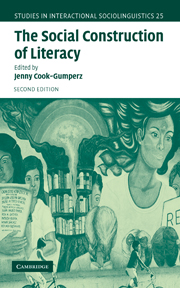Book contents
- Frontmatter
- Contents
- List of figures
- List of tables
- List of contributors
- Preface
- Acknowledgments
- 1 The social construction of literacy
- 2 Literacy and schooling: an unchanging equation?
- 3 Interactional sociolinguistics in the study of schooling
- 4 The language experience of children at home and at school
- 5 Narrative presentations: an oral preparation for literacy with first graders
- 6 Differential instruction in reading groups
- 7 Organizational constraints on reading group mobility
- 8 Developing mathematical literacy in a bilingual classroom
- 9 Spoken language strategies and reading acquisition
- 10 Speaking and writing: discourse strategies and the acquisition of literacy
- 11 The implicit discourse genres of standardized testing: what verbal analogy items require of test takers
- References
- Author index
- Subject index
4 - The language experience of children at home and at school
Published online by Cambridge University Press: 05 June 2012
- Frontmatter
- Contents
- List of figures
- List of tables
- List of contributors
- Preface
- Acknowledgments
- 1 The social construction of literacy
- 2 Literacy and schooling: an unchanging equation?
- 3 Interactional sociolinguistics in the study of schooling
- 4 The language experience of children at home and at school
- 5 Narrative presentations: an oral preparation for literacy with first graders
- 6 Differential instruction in reading groups
- 7 Organizational constraints on reading group mobility
- 8 Developing mathematical literacy in a bilingual classroom
- 9 Spoken language strategies and reading acquisition
- 10 Speaking and writing: discourse strategies and the acquisition of literacy
- 11 The implicit discourse genres of standardized testing: what verbal analogy items require of test takers
- References
- Author index
- Subject index
Summary
Preamble
It is now more than a quarter of a century since the study reported in the first edition of this book was completed. Nevertheless, to the best of my knowledge, no study of comparable scale has since been carried out that casts doubt on the original findings. I shall therefore retain most of the earlier chapter. However, I shall take the opportunity, in the final part of the current chapter, to say something about the collaborative action research with classroom teachers in which I have recently been engaged in the attempt to create richer opportunities for children to construct knowledge together through more dialogic forms of classroom interaction.
It has always been assumed that language plays a major role in formal education. And with good reason. Most of what is taught in schools is transmitted either through teachers' oral presentation or through textbooks and reference works, and when assessments of educational attainment are made they are typically made through the medium of questions and answers in either the spoken or the written mode. It seems self‐evident, therefore, that to succeed in school a pupil must have an adequate command of the linguistic skills of listening, speaking, reading, and writing.
Although correct as far as it goes, such a concept of the role of language in education is seriously misleading, since it leaves out of account the essentially interactive nature of linguistic communication.
- Type
- Chapter
- Information
- The Social Construction of Literacy , pp. 76 - 109Publisher: Cambridge University PressPrint publication year: 2006
- 2
- Cited by



